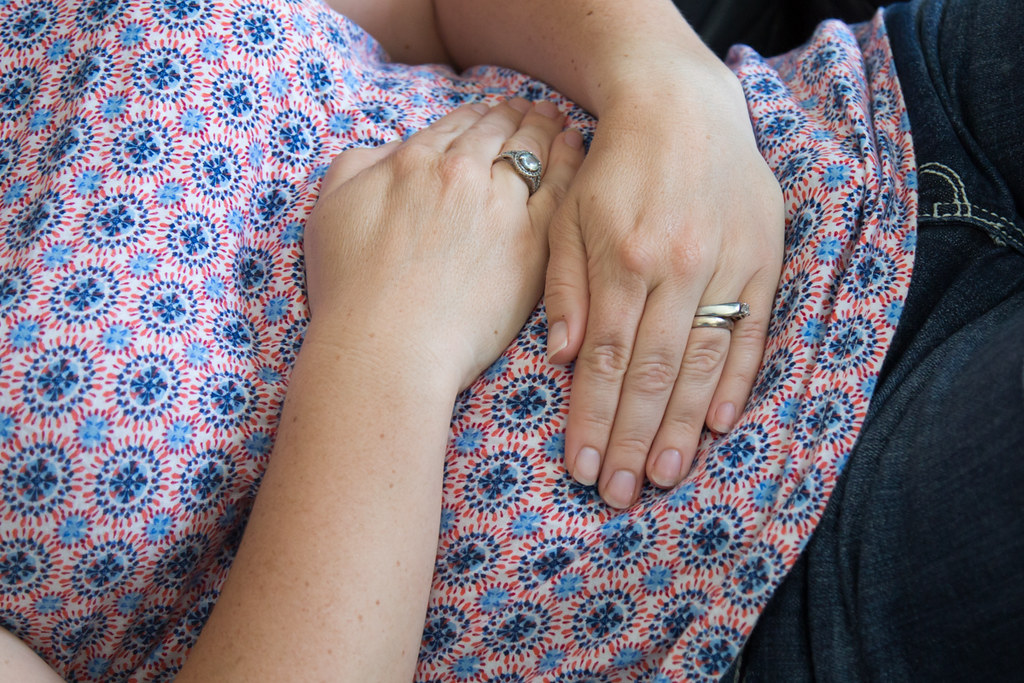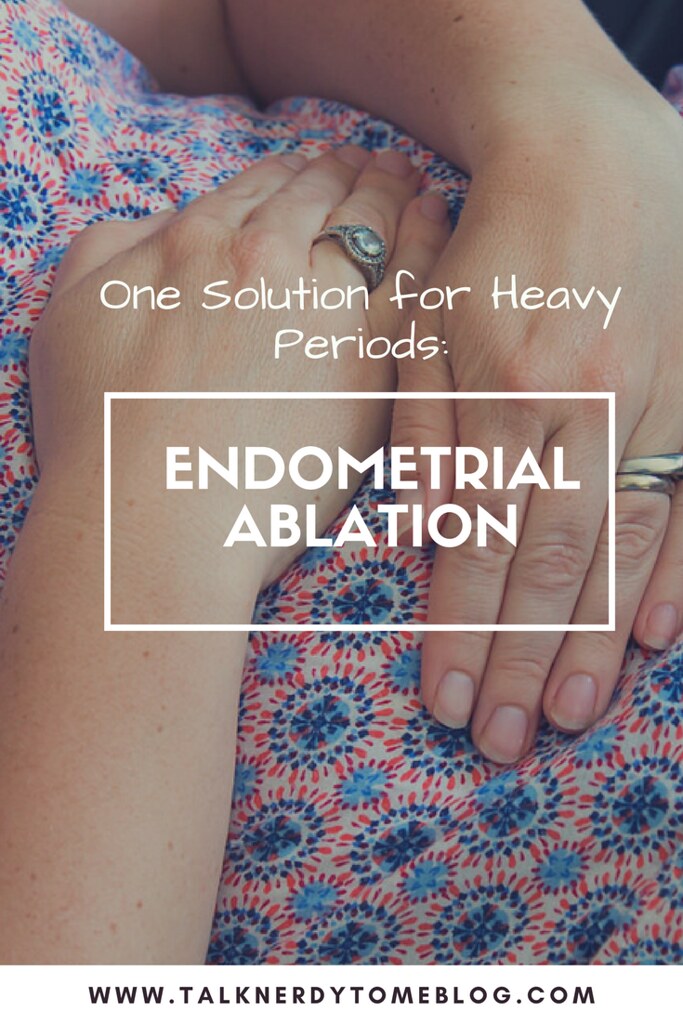**Warning: This post is about periods and surgery. There are words like vagina, uterus, blood and mucus. You've been warned! I share this to offer an option that I didn't even know was available until recently. Please talk to your doctor as I am not a medical professional.**
All my life I have struggled with heavy periods also known as menorrhagia. I didn't realize that mine was exceptionally heavy when I was younger; I thought that everyone needed to double up on protection and suffered with painful cramps and diarrhea. I would have to get my mom to pick me up from school, spend hours in the bathroom at night, and always worry about leakage. Yes, lovely memories. When I started using a Diva Cup several years ago, I realized just how heavy my period was. You are able to measure your flow and I found that in the first day alone I had over 2 oz of blood loss which is the equivalent of a full period for most women.
I did find that with the birth of my kids the period pain decreased but the blood loss was still quite great which meant I continued to struggle with anemia and the logistics of dealing with a heavy flow. Earlier this year a friend mentioned to me that she had just undergone an endometrial ablation which I had never even heard of–and I'm a science teacher! I was optimistic about a treatment that could possibly stop my periods without the use of hormones but nervous about potential risks like perforating the uterus. You need to be done having children as your uterus needs an endometrium (lining of the uterus) to support a fetus. I had my Fallopian tubes removed after the birth of our last child so this was not of concern to me. An endometrial ablation does not always completely remove periods but in 90% of the cases it will eliminate or dramatically reduce bleeding.
There were several steps that needed to be taken in order to get to the stage of having the ablation done. My doctor had to refer me to a gynecologist. Then, I had an ultrasound to see if there were any abnormalities, there was a blood test, and also an endometrial biopsy which was done right in the office (very similar to a Pap test just up past my cervix and into my uterus). A surgery date was booked and I had to wait about one month.
How does an endometrial ablation work? For my procedure I had it as day surgery under general anesthetic. A hysteroscopy was done first to look inside my uterus and make sure there were no abnormalities causing the heavy bleeding. Then they did a D&C followed by the ablation. The ablation can be done by several different techniques which all destroy the lining: radio frequency, electricity, thermal balloon (hot saline solution), or freezing. Mine was done with the hot saline solution in a balloon that went up through my vagina into my uterus. The procedure itself takes just a few minutes and an hour later I woke up in recovery.
I have never been under anesthetic before and the recovery from that was the hardest part. It was a full two weeks until I felt "with it" again which surprised me. The actual uterine discomfort was very bad for the first afternoon and evening after the procedure. I took pain medication but it felt like the worst cramping I had ever experienced–not pain, just writhing with discomfort. By the next day, my uterus felt fine, I was just very, very tired. Over the first month there is discharge mostly in the form of mucus as your uterus heals. As long as there is no odour this is expected and normal. Post surgery you are unable to have a bath for one week (showers are fine) and no sexual intercourse for three weeks.
I am very happy to report that I am one of the women who no longer gets her period! It feels so strange to get the tell tale signs of sore breasts and then...nothing! PMS symptoms can be reduced with this procedure and although I still get the bloating and sore breasts, I do feel that my mood swings are much better than before–so wonderful.
I'm looking forward to having another blood test soon to see how my iron levels are just two months after the procedure. I am so glad I had this endometrial ablation done as it has given me energy and freedom. If you have any questions, please ask away! Finally, I am not a medical professional and can only speak to my experience and 3 months post-surgery.
Love,
Louise
Pin here for later!
**Edited to add: I have recently read comments online about many women experiencing weight gain after having an endometrial ablation. I have experienced this myself (5 lbs) and although there doesn't appear to be any research on it, I did want to add this.**
.jpg)



Glad to hear that the procedure has been successful for you!
ReplyDeleteThank you, Carol. Me too! At first during recovery I was wondering if it was worth it but it sure was.
DeleteThis sounds amazing!! I am definitely going to have a conversation with my doctor about this! Thanks for sharing! I had never heard of this before!
ReplyDeleteYay! Hope the conversation goes well :)
Deletethank you for sharing this! I too will be chatting with my dr - 2 oz is a normal full period? I def have at least dbl that in the first 24 hours so worth a chat!
ReplyDeleteYes 2 oz is the max in a normal period from what I understand!
DeleteSorry... are you saying you have to be past child-bearing years? What exactly do you mean by that?
ReplyDeletei am WAY over 2oz in a full period. That's me in a few hours, sometimes...
I just mean you need to be done having kids because you can't get pregnant afterwards. Tried to rephrase it.
DeleteAh ok, that makes sense :)
DeleteI'm curious as to how much the keeper holds (that's the cup I use). Mine is usually overflowing 4-5 times each day for two days and then I empty only 2-4 times the other 4 or so days. Too much in my opinion. And I still need a back up with it.
ReplyDeleteI'm so glad I read this as I have my check up with my doctor in a month.
I'm assuming most cups are the same size. 3|4 full is 1/2 oz on mine. So I empty 4 times at least first day.
DeleteThe Diva Cup holds 1 ounce; I empty it (overflowing) probably 6-8 times on my two heavy days. I am also someone who has a lot of clots (which isn't normal either, but my doctor was never very concerned about it), so sometimes I am emptying it and it's 75% full with a clot(s). And after that, I'm 1-2 times a day.
DeleteSo interesting about measurements because I've always just looked at the 1/2 ounce measurement...I must have almost 4 oz on day one then if a full one is one ounce! Your periods are SO heavy, this is something you might want to look into. I will warn you, you probably won't be running for 3 weeks though. I was surprised at the recovery time mostly from being put under.
DeleteJust curious how you are doing now since your procedure, and how old you were when the procedure was done? Thanks in advance!
ReplyDeleteGreat question! I was 38 and now, three years later, I'm still doing very well! My period has not come back and my iron levels are higher.
DeleteI am planning to have an endometrial ablation to help in
ReplyDeletemy battle with iron deficiency. How are you feeling now, 6 years later? Any tips or regrets?